Work of fiction: How Jeffrey Wright & Co. are re-writing the book on Black stereotypes in “American Fiction”
- Oops!Something went wrong.Please try again later.
- Oops!Something went wrong.Please try again later.
- Oops!Something went wrong.Please try again later.
- Oops!Something went wrong.Please try again later.
- Oops!Something went wrong.Please try again later.
- Oops!Something went wrong.Please try again later.
Inside first-time writer-director Cord Jefferson's starry, satirical festival darling that's generating serious awards buzz.

Amazon/Orion Pictures
Jeffrey Wright in 'American Fiction'Race in America.
It is, perhaps, not the first thought that comes to mind when discussing a crowd-pleasing comedy. After all, in the wrong hands, racial satire can go sideways... real quick. Jokes can land with a thunderous, cringe-inducing thud — if there are any real jokes in the first place and not just pointed, if tired and obvious, observations.
But American Fiction is indeed crowd-pleasing. So far, the film — based on Percival Everett’s darkly comic 2001 novel Erasure — has won the People’s Choice Award at the Toronto International Film Festival and was the runner-up for the SCAD Savannah Film Festival’s Audience Award, and has received Best Picture nominations from the Golden Globes, Film Independent Spirit Awards, and Critics Choice Awards, along with major accolades from a handful of other festivals across the country. Not bad for writer-director Cord Jefferson’s first outing as a filmmaker.
“The thing that’s nice about the audience awards and stuff is that it’s not like a jury or an awards council. It’s just people who like to go to the movies. It’s just people who are fans of cinema,” Jefferson says a few days after accepting SCAD’s Breakthrough Director Award. “It’s really nice to know that there’s an audience for this, because a lot of people turned this movie down.”
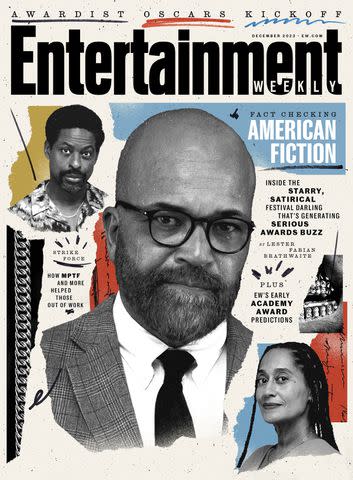
Cover Illustration by Mark Harris; Photos: Claire Fogler/Orion Pictures
'American Fiction' stars Sterling K. Brown, Jeffrey Wright, and Tracee Ellis Ross on the cover of 'Entertainment Weekly'Ironically (or fittingly?), the struggles to get American Fiction made mirror some of the themes of Everett’snovel, which Jefferson recalls first reading and thinking “felt like somebody had sat down to write Cord Jefferson a book personally.”
“It deals with a bunch of stuff, but one of the themes is how the expectations for Black creatives is such that if you want to write something that’s, quote, ‘important and prestigious’ for Black people, then there’s a very limited scope of what it can be about. So that includes slavery, inner-city poverty, civil rights abuses, violence, drug dealing...” Jefferson explains. “And [Everett’s] wondering: Why are these the only things that people see as being Black life? Why is anything that doesn’t resemble these kinds of standard stories not considered black enough?”
American Fiction explores those questions through acerbic protagonist Thelonious “Monk” Ellison (Jeffrey Wright). A once moderately successful writer treading water as an English professor, Monk’s literary glory days are seemingly far behind him. Until, out of exasperation, he writes what he knows everyone wants from a Black writer: a brutal, clichéd trudge through inner-city life. It’s all meant as a joke. In fact, he doesn’t even want his real name attached to the story, so he writes it under the pseudonym Stagg R. Leigh.
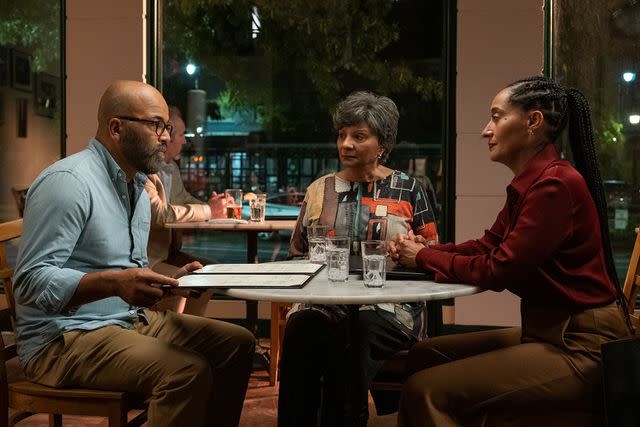
Amazon/Orion Pictures
Jeffrey Wright, Tracee Ellis Ross, and Leslie Uggams in 'American Fiction'But the joke’s actually on Monk when — to his shock, horror, and great annoyance — publishing houses start clamoring for the manuscript. From there, things get wildly out of hand, setting Monk on an unexpected path while contending with an aging mother (Leslie Uggams), his estranged siblings (Tracee Ellis Ross and Sterling K. Brown), and an intriguing new love interest (Erika Alexander). Entrusting a first-time director best known for TV writing gigs to produce a balanced film that manages to skewer white guilt and white saviorhood, as well as Black exceptionalism and Black stereotypes, rote media narratives, the limits placed on artistic expression, academic posturing, the publishing industry’s so-called “reckoning,” and Hollywood’s exuberantly misguided wokeness — all without coming off as preachy while simultaneously being incredibly funny — may seem like a risk. But Rian Johnson, whose T-Street Productions produced American Fiction, knew they had no reason to worry after witnessing Jefferson through the editing process, an experience the Knives Out mastermind describes as “like watching someone do a high-wire stunt and pull it off.”
“Especially for a first film, it’s a very intricate, complicated movie, in terms of tone,” he says. “It’s balancing a lot of things: It’s balancing the family drama, it’s balancing genuine drama, it’s balancing comedy of different amounts of broadness. It’s got a meta element woven through it. It’s a complex stew.”
And packaging all that into a thoroughly entertaining movie is, he adds, “the real magic trick.”
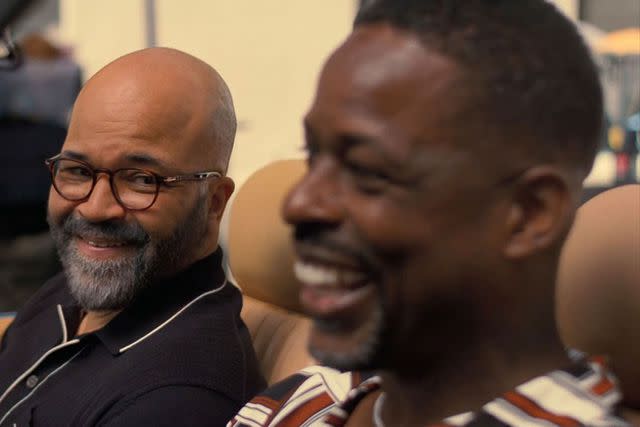
Amazon/Orion Pictures
Jeffrey Wright and Sterling K. Brown in 'American Fiction'An Emmy winner for writing on HBO’s acclaimed limited series Watchmen, Jefferson had never directed a movie before; he had never even written a film script by himself before. But while working on Master of None in 2016, that show’s creator, Aziz Ansari, put a little creative bug in Jefferson’s ear.
“We were talking about directors for the episodes, and he said, ‘Have you ever thought about directing?’” says Jefferson, who demurred, telling his boss he didn’t know anything about cameras and never went to film school. “And [Ansari] was like, ‘I didn’t go to film school. I went to NYU for business, and I got nominated for a Golden Globe for directing.’ ”
Still, Jefferson knew directing would be a difficult, arduous labor. If he decided to put himself through that, he needed to make sure it was a labor of love. Once he read Erasure, he knew he’d found the right project.
In adapting Everett’s novel, Jefferson was determined to maintain what he loved about it in the first place. That said, he made changes during the adaptation process: omitting characters and storylines, adding an encounter he had craved in the book that went unrealized, and lightening the tone to make room for the expansive language of cinema.
“There’s a certain textual playfulness from the book,” Jefferson explains.“There’s some experimentation and some surreality in the book. So I wanted to find a way to cut some stuff to the bone in order to give us some time for the film, but also maintain that kind of weird spirit that the novel, and basically all of Percival’s novels, have.”
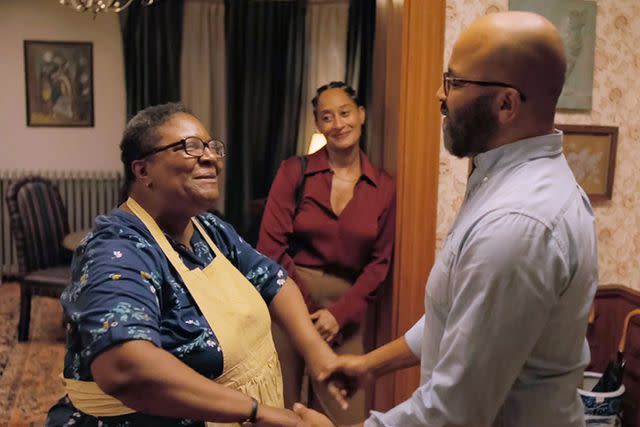
Amazon/Orion Pictures
Myra Lucretia Taylor, Tracee Ellis Ross, and Jeffrey Wright in 'American Fiction'Even before Jefferson started adapting Erasure, he was reading the novel in Jeffrey Wright’s voice and imagining the star in the book’s scenes.
“Jeffrey Wright is a national treasure. The vast majority of people who know acting in a very deep way will tell you, ‘Jeffrey Wright is one of our greatest living actors,’” Jefferson says of the Westworld star, whom he couldn’t recall in a lead movie role since 1996’s Basquiat. “Why has it been 30 years since I saw him in a lead? Why is this man not getting these kinds of roles, despite the fact that everybody knows he deserves these kinds of roles?”
Wright was the first casting call made once the script was ready, and once he signed on, “everything got easier,” says Jefferson. “The financiers came up with more money. Other actors were eager to work with Jeffrey. It was just like, ‘Oh my God, Jeffrey Wright? I would love to work with Jeffrey Wright!’ So the process really just became streamlined.”
Jefferson thought he was lucky to secure Wright and had assumed his luck had run out when he reached out to Tracee Ellis Ross to play Monk’s sister Lisa. But then she too signed on, and so did Sterling K. Brown as his brother Cliff, and Issa Rae as rival author Sintara Golden, and the great Leslie Uggams as Monk’s mother, Agnes. Jefferson felt as if he had accumulated “this crazy embarrassment of riches.” Or as Johnson puts it: “Every single person in it is just stone-cold amazing. Sterling, Issa, and Tracee, all of them — I’m thrilled when they pop up. You get that kind of combination together, and that’s the golden ticket in terms of casting.”
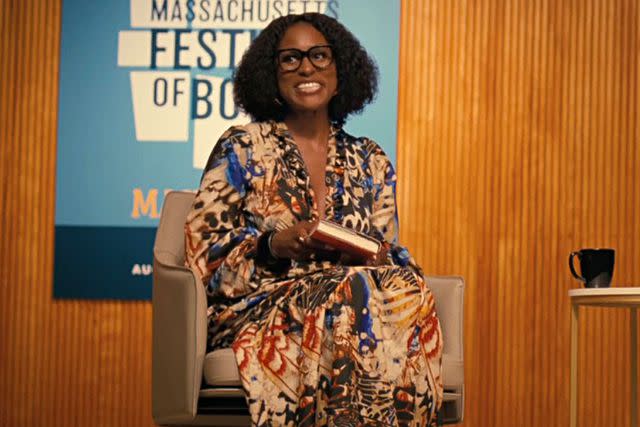
Amazon/Orion Pictures
Issa Rae in 'American Fiction'Before Jefferson began to shop the finished script around town to producers, he attached one crucial caveat: “I said, ‘You have to agree to let me direct the thing before I’ll let you read the script.’”
That may seem like a lot of confidence for someone who didn’t go to film or NYU business school, but it was less about Jefferson’s confidence in his own abilities than in his kinship with Erasure.
“When I found this novel, I just felt it so deep in my bones,” he says. “I felt like I understood the material so deeply that even if I got to set and everything was foreign to me — I felt underwater when it comes to lighting and cameras, and I felt out of my depth in everything — the thing that I know is this story. I know this story. I understand the characters, I understand the emotions. I understand the story from back to front in a really, really personal way. I understand it, and I can build around that.”
"Jeffrey Wright is a national treasure."
"
'American Fiction' director Cord Jefferson
The burgeoning filmmaker prepared himself for his first directing gig with a mood board of inspirations, ranging from satires such as Robert Townsend’s Hollywood Shuffle, Spike Lee’s Bamboozled, and Robert Downey Sr.’s Putney Swope to the films of Noah Baumbach and Nicole Holofcener, whom he credits with helping him find the right tone for American Fiction.
“What they do really well, in my opinion, is really get the tone of life,” Jefferson explains. “And that life is neither comedy nor tragedy. It’s sort of frequently both of those things at once. I wanted to make sure that the movie didn’t collapse under the weight of the satire. I never wanted to become farce.”
For all his preparation, however, Jefferson admits to being intimidated by Wright on his first day on set — likening directing the revered actor to teaching “LeBron James how to shoot a jump shot.” But in Wright, the novice auteur had a willing and eager collaborator.
They both agreed that they didn’t want to end up making “a movie that felt like it was policing Blackness and policing. We never wanted it to be like, Bill Cosby's ‘Pull up your pants’ respectability politics.
“I never wanted this film to feel didactic,” Jefferson adds. “I just want people to come in and have fun and laugh, maybe laugh at themselves. Maybe cringe a little bit, but then leave the theater with whomever they came to see it with — their friends or their family, or even strangers — and say, ‘Do you want to go grab a drink or dinner and talk about what we just saw? Because I can’t stop thinking about it.’ ”
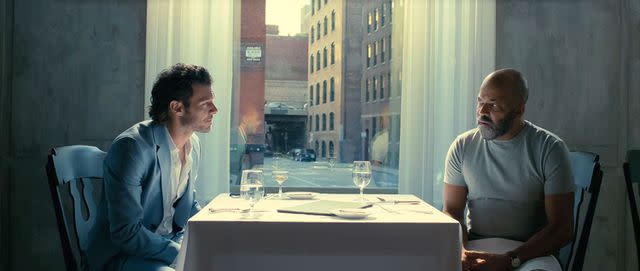
Amazon/Orion Pictures
Adam Brody and Jeffrey Wright in 'American Fiction'Johnson shares a similar wish, anticipating the conversations American Fiction will inspire when it opens in limited release on Dec. 15 and expands the following weekend. “It’s savage when it’s angry, and it also has a massive heart — and you can tell where that heart is,” he says. “It’s just the ingredients of the type of movie that gets your blood pumping and that we don’t see a lot of these days.”
The festival audiences seem to agree, but Jefferson perhaps values the opinion of one particular audience member over all others: One night, while he was still working on the film, he nervously invited Percival Everett and his wife, fellow writer Danzy Senna, over to his house to watch it.
“I was so afraid. I was so afraid that they were going to dislike it,” Jefferson recounts. “But after he watched, Percival said, ‘The thing that I really appreciate about it is that you clearly used my book as a launchpad, but then you went and made something that feels entirely unique unto itself. You made a piece of art that stands alone.’And that meant the world to me.”
Seems like Jefferson is adapting well... all puns intended.
Check out more from EW's The Awardist, featuring exclusive interviews, analysis, and our podcast diving into all the highlights from the year's best in TV.
Related content:
Cord Jefferson writes where it hurts with Jeffrey Wright-led American Fiction
2024 Oscars predictions: Who will get nominations for Best Picture and acting?
See top 2024 Oscars contenders for Best Picture, Actor, Actress, and more
American Fiction takes top honors at the 2023 Toronto International Film Festival
Read the original article on Entertainment Weekly.

